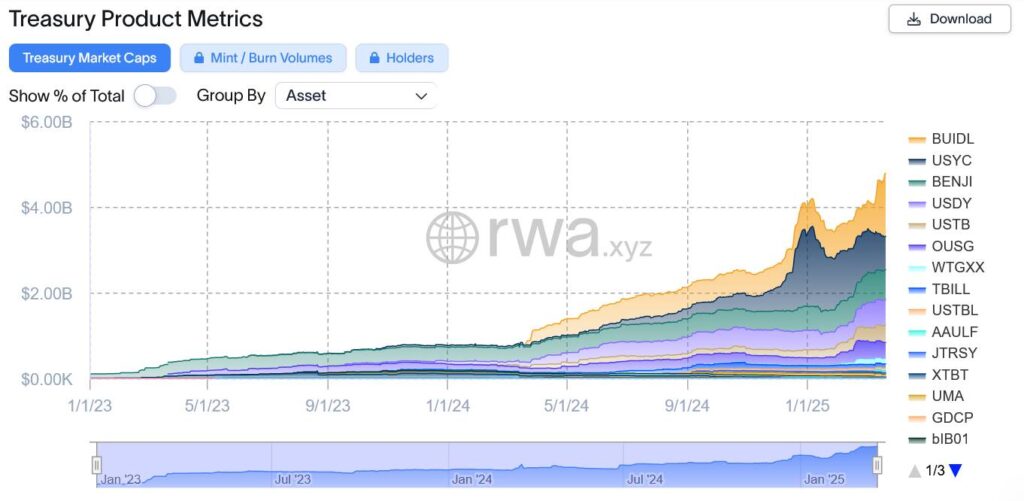In a significant move for the cryptocurrency and finance sectors, Fidelity Investments has submitted a filing with U.S. regulators to register a tokenized version of its US dollar money market fund, aptly named OnChain, on the Ethereum blockchain. This development positions Fidelity alongside industry giants like BlackRock and Franklin Templeton, who are also venturing into the realm of blockchain tokenization.
The filing, submitted on March 21, outlines how OnChain will enhance transaction tracking for the Fidelity Treasury Digital Fund (FYHXX), which currently manages an impressive million, largely backed by US Treasury bills. While OnChain awaits regulatory approval, Fidelity projects a launch date of May 30.
“Although the secondary recording of the OnChain class on a blockchain will not represent the official record of ownership, the transfer agent will reconcile the secondary blockchain transactions with the official records of the OnChain class on at least a daily basis.”
Fidelity emphasizes that it will maintain traditional book-entry records as the official ownership ledger, even as it explores the innovative concept of blockchain-based transaction visibility. Notably, the actual US Treasury bills will not be directly tokenized. This marks a noteworthy step in a wider trend where asset managers are increasingly utilizing blockchain technology to tokenize various financial products, including Treasury bills and private credit. The current market for tokenizing real-world assets (RWAs) related to Treasury products is valued at around .78 billion, with BlackRock’s USD Institutional Digital Liquidity Fund holding a leading position at .46 billion.
Ethereum remains the top choice for asset managers looking to implement such tokenization projects, as highlighted by BlackRock’s head of crypto, Robbie Mitchnick, who affirmed its reputation for decentralization and security at the recent Digital Asset Summit in New York. As Fidelity prepares to launch OnChain, the landscape of traditional finance increasingly intertwines with the innovative technologies of the blockchain world, illustrating a new era for investment transparency and efficiency.
Fidelity Investments Embraces Tokenization with OnChain
Fidelity Investments is moving forward in the blockchain space by filing to register a tokenized version of its US dollar money market fund, potentially impacting investors and the broader financial landscape.
- Fidelity’s Tokenization Initiative:
- Filed to launch a tokenized version of the Fidelity Treasury Digital Fund (FYHXX).
- The fund consists primarily of US Treasury bills and is valued at million.
- OnChain Overview:
- OnChain aims to enhance transparency and verifiable tracking for FYHXX transactions.
- Official ownership records will still be maintained in traditional formats alongside blockchain records.
- Regulatory Approval and Launch:
- OnChain is pending regulatory approval, with expectations to go live by May 30.
- Utilizing Ethereum as the blockchain for its tokenization aligns it with other major asset managers.
- Market Context:
- Fidelity joins BlackRock and Franklin Templeton in exploring blockchain to tokenize financial assets.
- The RWA tokenization market for Treasury products is valued at .78 billion.
- BlackRock’s USD Institutional Digital Liquidity Fund leads the market with .46 billion.
- Future Developments:
- Potential for expansion of OnChain to other blockchains in the future.
- Significant growth in tokenized RWAs on Ethereum, currently exceeding .3 billion.
“Clients clearly are making choices that they do value the decentralization, they do value the credibility, and the security.” — Robbie Mitchnick, BlackRock’s Head of Crypto
The emergence of tokenized funds like Fidelity’s OnChain could impact readers’ lives by enhancing investment options, providing greater transparency in asset management, and reflecting a larger trend towards the incorporation of blockchain technology in traditional finance.
Fidelity Investments Enters Blockchain Tokenization Arena: What It Means for the Market
Fidelity Investments has made a noteworthy move by filing to register a tokenized version of its US dollar money market fund on Ethereum, positioning itself alongside heavyweights like BlackRock and Franklin Templeton in the burgeoning blockchain tokenization space. This development showcases Fidelity’s ambition to enhance transparency and verifiable tracking of share transactions, although the official ownership ledger will still rely on traditional methods.
One competitive advantage of Fidelity entering this arena lies in its established reputation and vast resources. As a giant in the asset management space, Fidelity brings institutional credibility to tokenization, which can attract both retail and institutional investors wary of new technologies. Their immediate offering of the Fidelity Treasury Digital Fund (FYHXX), composed mainly of US Treasury bills, could provide a more stable entry point into the world of tokenized assets.
However, there are disadvantages to consider as well. The OnChain class will not serve as the official ownership record, which may confuse potential investors about the actual ownership rights. Moreover, Fidelity’s requirement for its transactions to reconcile daily with traditional records could raise concerns regarding scalability and efficiency, especially compared to entirely decentralized systems that operate without intermediaries.
In the broader landscape, Fidelity’s entrance could be a boon for traditional finance (TradFi) entities looking to leverage the benefits of decentralized finance (DeFi) without fully giving up their conventional systems. By adopting tokenization, they can provide clients with enhanced transparency while still adhering to regulatory frameworks. Conversely, this move may pressure other asset managers who have been slower to adapt, potentially pushing them to expedite their own blockchain initiatives.
The impact of Fidelity’s strategic decision also reaches deep into the investor community. Institutional investors seeking innovative solutions may find increased legitimacy and confidence in tokenized assets, seeing them as a bridge to a more advanced financial landscape. On the flip side, smaller, less-established firms in the asset management sector may struggle to compete, as Fidelity’s brand recognition and regulatory compliance could create a significant barrier to entry in this novel marketplace.
As asset managers continue to explore blockchain tokenization for Treasury bills and private credit, Fidelity’s move could set a benchmark for transparency and security, making it a pivotal player in the ongoing evolution of the financial industry.
















